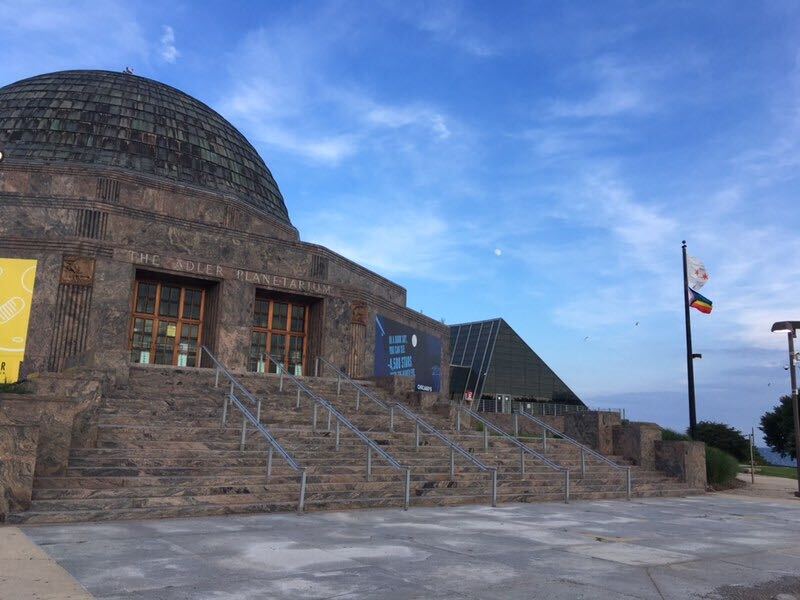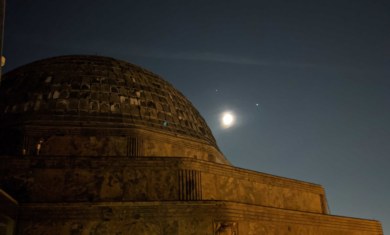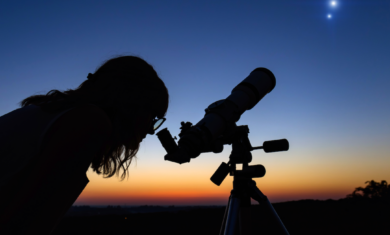Adler Astronomers Love Talking Space

Header Image: The Adler Planetarium with a Full Moon in the background taken by Adler Planetarium Telescope Volunteer in July 2020. Image Credit: Bill Chiu
You have space questions, we have answers! Astronomers are constantly discovering and uncovering new secrets about space, which we know can lead to lots of questions. Will a black hole take you to another universe? Why do supermoons have additional names? Is the universe really “expanding”? Here are answers to more frequently asked questions Adler Planetarium astronomers receive.
How old is the universe?
“13.8 billion years. By studying the leftover light from the Big Bang astronomers have figured out the age of the universe with an uncertainty of only 20 million years!” – Astronomer Geza
How long will we be able to communicate with the Voyager Probes for?
“Due to declining power, engineers will start to turn off instruments on V2 in 2020 and on V1 in 2021. We expect both to continue operating at least 1 instrument until ~ 2025. Spacecraft health data could be sent past 2025. We could still detect signals through ~2036, at which point the radio signals may be too faint to receive on Earth.” – Astronomer Michelle
Learn more about the Voyager Probes by reading frequently asked questions answered by NASA.
What is an interesting fact you know about Earth?
“The fact we have oxygen for we humans to breathe is because of tiny microbes called cyanobacteria—though tiny, there were so many they transformed Earth’s atmosphere! Cyanobacteria are still around today: they build rocky structures called “stromatolites” that still exist in some salty lagoons and bays around the world. Look up a picture, just in case you see one—and remember to say thanks, cyanobacteria!” – Astronomer Lucianne
What’s your favorite mind-blowing space fact?
“The Big Bang didn’t happen “somewhere else”. It happened right “here”, and “there” and “everywhere”. You are standing right where the Big Bang happened!” – Astronomer Geza
Why do supermoons and Full Moons have additional names? For example, the supermoon in May was also known as the Flower Moon.
“Many cultures have assigned names to the various lunar cycles throughout the year. The cycle happening around May is called, by some, the “flower” moon for the flowers that bloom in that month.” – Astronomer Michelle
Read 5 Things To Know About Supermoons to learn more about the cultural references of Full Moon names.
What is a particle accelerator for?
“Particle accelerators are like scientific demolition derbies— they’re how we smash particles together, and study the wreckage that comes out. Astronomers study what the universe is made of: not just things like stars and planets, but also the basic building blocks of everything. When we smash particles together in an accelerator, the “wreckage” is in the form of other, harder-to-catch particles that we also want to understand, kind of like catching rare, cool Pokemon. If we want to really understand the universe— we gotta catch ‘em all!” – Astronomer Lucianne
What does it mean that space is “expanding,” and if it is, what is it expanding into?
“When scientists say that space is expanding they mean that the “fabric” itself of space is expanding, much like the surface area of a balloon gets larger as it is blown up. This is only an analogy though. Einstein’s actual equations describe the expansion of space without it needing to expand into anything. Some recent theories suggest that there may be larger dimensions that the universe is just a part of. We aren’t sure of this though.” – Astronomer Geza
Are there other planets that could possibly support life?
“There are definitely some great candidates! Astronomers have found thousands of planets around other stars in the past ten years or so, and an important outcome of that search is that small, rocky planets like Earth, Venus, and Mars are really common. There are even a few of those planets that get a similar amount of warmth from their suns as the Earth does, and those are our best guess as to where we might find life. Will it be like Earth life? We don’t know yet! But that’s part of what makes it exciting to try and find out.” – Astronomer Lucianne
If you go through a black hole will you travel to another universe?
“Probably not. Most likely you will be stretched and torn apart. As you get close to a black hole the pull of gravity gets very strong. Close in, the gravity near your feet would be so much stronger than at your head that the difference would rip you in two! Even if you could survive that, you’d be squeezed into a point of zero volume as you hit the center.” – Astronomer Geza
Learn more about black holes from previous frequently asked questions in The Adler ‘Scope blog: You Asked, Our Astronomers Answered!
Who is your favorite scientist and what did they contribute to learning about space?
“My favorite scientist is Emmy Noether. Dr. Noether was a mathematician who studied algebraic number theory and symmetries. It sounds very abstract, but her work on symmetries and conservation laws is incredibly powerful and beautiful. Her insights explain why there is order and structure in the universe instead of chaos.” – Astronomer Geza
“My favorite scientist is Dr. Carl Sagan. He had such an amazing way of explaining and describing the universe and what’s in it.” – Astronomer Michelle
We love talking space! If you have more questions, ask us on Instagram and Twitter by using the hashtag #AskAdler. You can learn how telescopes work in our latest Astronomy In 3 Minutes episode or submit a question to one of our astronomers directly on the Ask Adler resources page.







